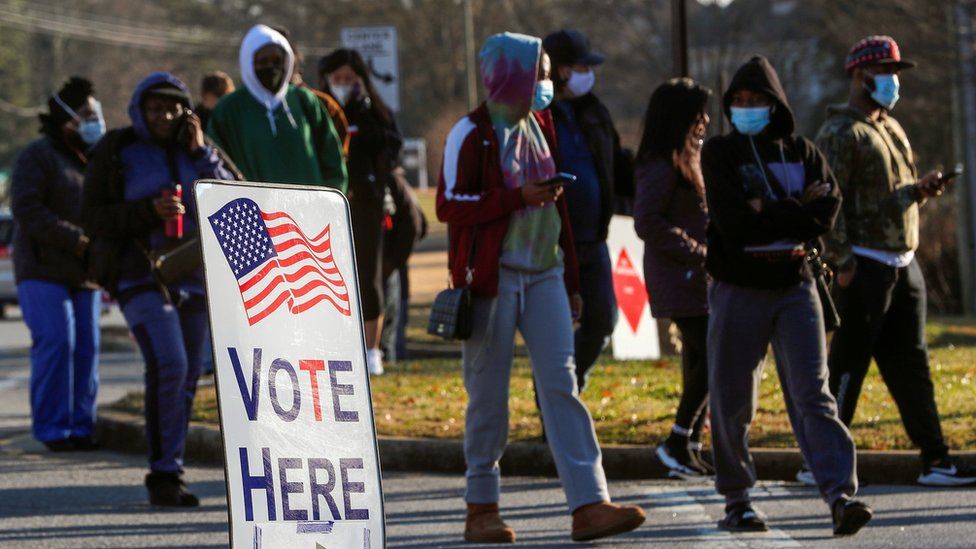Russia's Putin authorised pro-Trump 'influence' campaign, US intelligence says
- Published

The report said there was no evidence that Russia and Iran directly meddled with the voting process
Russian President Vladimir Putin is likely to have authorised attempts to influence last year's US election in favour of former President Donald Trump, intelligence officials say.
Moscow spread "misleading or unsubstantiated allegations" about the eventual winner, external, Joe Biden, according to a US government report.
But it said no foreign government had compromised the final results.
Russia called the allegations of election interference "baseless".
"The conclusions of the report... are confirmed solely by the confidence of the intelligence services of their self-righteousness," the Russian embassy in Washington said in a statement. "No facts or specific evidence of such claims were provided."
The US is expected to impose sanctions on Russia as soon as next week over the report's conclusions, three sources told Reuters news agency.
Iran 'sought to weaken Trump support'
The 15-page report, released on Tuesday by the Office of the Director of National Intelligence, outlined what it said were "influence operations" pushed by Russia as well as Iran.
It said Russian-linked individuals had spread unsubstantiated claims about President Biden ahead of the 3 November election. It also said a disinformation campaign sought to undermine confidence in the broader election process.
Some people connected to Russian intelligence also pushed anti-Biden narratives to media outlets, senior officials and allies of Mr Trump, the report said.
President Biden defeated Mr Trump and was inaugurated on 20 January.
The report added that, while Russia had sought to boost Mr Trump's chances of victory, Iran had launched a "multi-pronged covert influence campaign" in an effort to weaken his support.
The former president pursued a policy of "maximum pressure" on Iran, imposing damaging sanctions and escalating a war of words between the two nations.
The report also concluded with "high confidence" that China, which has long been accused of cyber-espionage by Washington, chose not to "deploy interference efforts" ahead of the vote.
"China sought stability in its relationship with the United States and did not view either election outcome as being advantageous enough for China to risk blowback if caught," it said.
US intelligence concluded in 2016 that Russia was behind an effort to undermine Hillary Clinton's presidential run against Mr Trump
According to the report, the voting process and final results were not interfered with by foreign states.
The intelligence report was released at the same time as a joint investigation by the departments of Justice and Homeland Security which came to a similar conclusion.
Their report said "broad Russian and Iranian campaigns targeting multiple critical infrastructure sectors did compromise the security of several networks that managed some election functions".
But it emphasised that the alleged interference attempts were largely indirect.
"We have no indications that any foreign actor attempted to interfere... by altering any technical aspect of the voting process, including voter registration, ballot casting, vote tabulation, or reporting results," the document reads.
The US intelligence community said last August that China, Russia and Iran were actively trying to meddle in the forthcoming presidential election.
The assessment found that Russia was seeking to "denigrate" Mr Biden. It also found that China and Iran wanted Mr Trump to lose the vote.
Home-grown misinformation of equal concern
Analysis by Alistair Coleman, BBC Monitoring
US intelligence officials accuse Russia of making "unsubstantiated allegations" about Mr Biden, but research shows the dominant drivers of misinformation about the election were closer to home.
Mr Trump and his supporters consistently promoted unfounded claims about widespread voter fraud on social media before, during and after the election.
Many accused Mr Trump of deliberately trying to undermine faith in the election process - the same allegation now being levelled at Russia.
How much do the American intelligence agencies think the Russian operation boosted the former president's effort? The declassified report, scant on detail, doesn't really say.
If the goal of the alleged influence campaigns was to sway the vote in Mr Trump's favour, it clearly failed.
But operations that seek to create confusion and stoke division are a tool that countries will continue to use - and not only during elections.
The Washington riots on 6 January, though not driven by a foreign power, provided a powerful example of how misinformation spread online can threaten democracy and result in real-world violence.
You might also be interested in:
From 2016: Gordon Corera reports on an "extraordinary" claim Russia tried to influence the US election
- Published18 December 2020
- Published3 December 2020
- Published18 November 2020
- Published16 November 2020
- Published11 November 2020